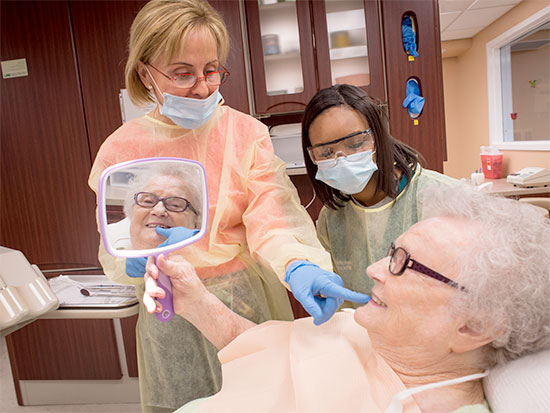 Lillian Mitchell, standing, checks on one of her patients.In Oral Health America’s newly released 2018 A State of Decay report, Alabama rose to No. 29 from No. 50 in the new state-by-state rankings on the status of oral health and outcomes in Americans age 65 and older. This elevated ranking reflects a joint commitment made by state public health officials, other dental organizations, and the University of Alabama at Birmingham School of Dentistry faculty, students and alumni to improve outcomes in this population after an alarming last-place ranking in the previous report.
Lillian Mitchell, standing, checks on one of her patients.In Oral Health America’s newly released 2018 A State of Decay report, Alabama rose to No. 29 from No. 50 in the new state-by-state rankings on the status of oral health and outcomes in Americans age 65 and older. This elevated ranking reflects a joint commitment made by state public health officials, other dental organizations, and the University of Alabama at Birmingham School of Dentistry faculty, students and alumni to improve outcomes in this population after an alarming last-place ranking in the previous report.
Oral Health America’s ongoing four-volume report analyzes variables that impact the oral health of senior populations, while also spotlighting the successes and shortcomings of oral health care at the state level. The report encourages states to use the findings to address oral health-related issues in senior citizens and unite advocates to push for national changes that will improve oral health care in all populations.
“The substantial rise in rankings is indicative of a shared commitment made by many in our state to improve oral health outcomes in one of our most vulnerable populations,” said Conan Davis, DMD, assistant dean for UAB’s School of Dentistry Division of Community Collaborations and Public Health. “While Alabama has specific factors that pose challenges for our senior population, including no adult dental benefits in Medicaid and limited access to care in rural populations, the School of Dentistry feels a particular responsibility to lead the way and to provide senior Alabamians unmatched dental resources.”
Performance measurements that contributed to rankings included the percentage of state residents with access to a fluoridated community water supply, the number of oral health services covered by Medicaid, inclusion of older adults in a state oral health plan, and completion of an older adult basic screening survey.
| “While Alabama has specific factors that pose challenges for our senior population, including no adult dental benefits in Medicaid and limited access to care in rural populations, the School of Dentistry feels a particular responsibility to lead the way and to provide senior Alabamians unmatched dental resources.” |
Findings showed that, in Alabama, 45.1 percent of people age 65 and older have severe tooth loss, while 78.6 percent of our state population has access to community water fluoridation. A new state oral health plan, developed by the Alabama Department of Public Health — with guidance from the UAB School of Dentistry and others — outlines five key objectives that will enable the state to continue to measure success.
An impressive statistic reported was that 60.9 percent of people age 65 and older have annual dental visits, growth that the School of Dentistry attributes to specific school-sponsored programs and a measure they hope to continue to improve. Under the guidance of Lillian Mitchell, DDS, director of Geriatric Dentistry at UAB, outreach programs to elders in rural communities have enabled dental students to use grant-funded portable dental equipment to provide cleanings, screenings and educational opportunities to these patients in the comfort of their community.
“The outreach programs we have implemented have been catalysts for engaging this older population, particularly in rural communities that often have minimal access to adequate oral health care,” Mitchell said. “The basic oral health education we are able to share has led many to schedule future appointments, a chain reaction that continues to benefit the health of seniors in our state.”
In looking forward, Davis, Mitchell and other state health officials believe this is just the beginning for Alabama in terms of increasing outcomes for seniors and continued favorable rankings.
“This report gives us a benchmark of where we can continue to make strides and also changes the dialogue about Alabama — we are and can continue to be a state that provides optimal oral health resources and care to all at-risk populations, specifically our older generations who need our care now more than ever,” Davis said.